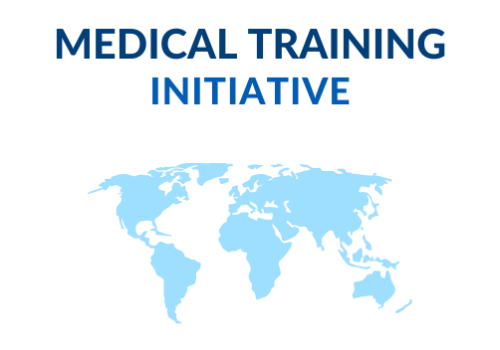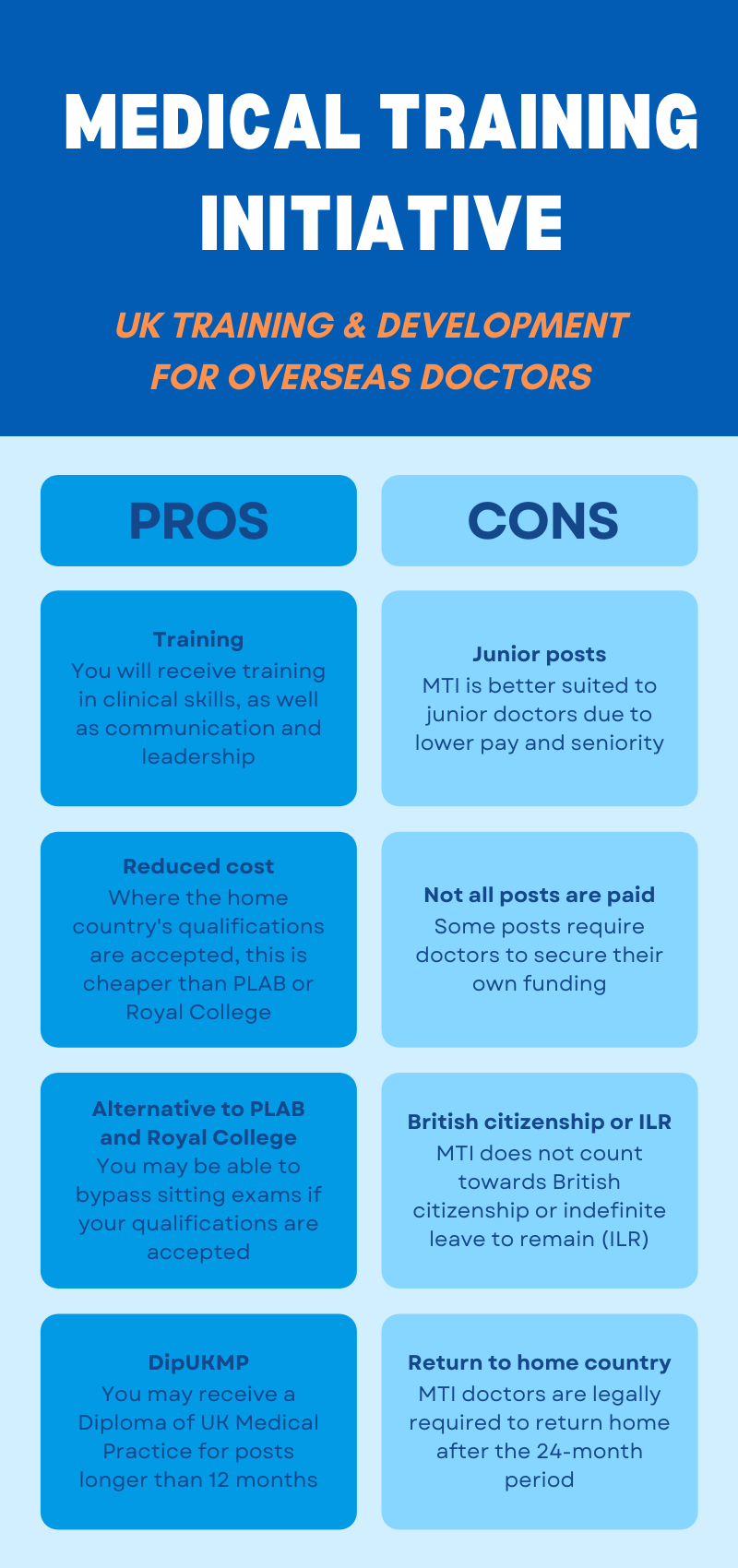Medical Training Initiative (MTI) – a comprehensive guide for doctors
- November 18, 2021

Here we take a closer look at the Medical Training Initiative (MTI), a placement scheme for more junior overseas doctors to come to the UK to receive training and development within the NHS.
To be eligible for an MTI post, certain criteria must be met. These are summarised below along with a broad look the following:
- What is the Medical Training Initiative?
- What training will I receive through the MTI?
- Am I eligible for an MTI post?
- What does the application process for the MTI involve?
- What are the advantages and disadvantages of the MTI?
- Do I need a visa for the MTI?
- How can I use the MTI for GMC registration?
- How much will I be paid throughout the MTI?
- What is the full process for MTI?
- I’ve completed the MTI, what’s next?
Skip ahead to the relevant section if you know what you’re looking for.
The Medical Training Initiative
The Medical Training Initiative, or MTI, is a training programme that provides junior doctors from all over the world the opportunity to gain clinical training and development in the UK for a maximum of 24 months.
The MTI as a training scheme is mutually beneficial for both junior doctors and the NHS, in that doctors from several countries and specialisms around the world can work and train in the UK, gaining knowledge and experience which they can take back to their home country, while giving NHS Trusts a high-quality, longer-term alternative for unfilled training vacancies and rota gaps.
Training
The training provided through the MTI scheme will vary between programmes; however, it will typically follow the CCT curriculum (Certificate of Completion of Training). The level of training will be highly dependent on the doctor’s interests, competence and the training available within the placement hospital.
At the beginning of each placement, doctors are allocated an Educational Supervisor who will help to set the doctor’s specific training objectives to meet over the 24 months of the placement.
Eligibility
The MTI has been designed specifically with junior doctors in mind, therefore sponsorship will not be offered to consultants, specialty doctors or for locum-appointed service posts (LAS).
The criteria also differ among MTI programmes, so eligibility criteria should be checked directly with the Royal College before applying. However, the general elements of eligibility include the following:
- Country requirements - priority is given to doctors from countries classified as low income or lower middle income by the World Bank. Doctors from outside of these countries may also apply, but there may be a long wait time and no guarantee of acceptance.
- Evidence of skills and knowledge – the requirements for evidence of skills and knowledge vary based on the MTI programme, but the potential requirements for evidence of skills and knowledge include:
- PLAB exams
- Part 1 of relevant Royal College exam e.g. MRCP
- Specialist qualifications from your home country
- Evidence of English language skills - almost all MTI programs accept what test is approved by the GMC, meaning either of the IELTS or OET can be used for MTI.
- Sufficient clinical experience - most MTI programmes will require a minimum of three years' experience, including one year of internship and one year in the relevant specialty.
- Active medical practice - candidates must have been actively practicing clinically for at least three out of the last five years including the past 12 months before the application as well as throughout the application process.
The Application Process
There are two ways to join the MTI programme:
- Apply for an MTI-match programme – certain specialisms have programmes which match doctors to a job. For these, you apply for the relevant programme, providing the necessary documentation. If your application is successful, you will be allocated a suitable job, which can take up to 12 months.
- Find an NHS job before applying for the MTI – in cases where specialties do not have an established match programme, candidates are required to apply directly for an NHS post. Once the candidate has been accepted for the role, they can then apply for the MTI scheme through the relevant Royal College. If you would like to know more about finding NHS posts for the MTI scheme, you can get in touch with us here.
Specialties may use either, or a combination of these two methods, so we suggest visiting the Royal College and searching for their information on the MTI scheme.
The availability of MTI posts will vary between each Royal College, as certain specialties are more consultant-led, meaning there are fewer training posts for junior doctors. Once again, we suggest finding out more from the relevant Royal College.
Advantages and Disadvantages of the MTI Scheme

Advantages
- Training – MTI doctors will receive training and development support in their clinical, communication and leadership skills, as well as supervision by a consultant. You will also have the opportunity to create a training plan with the support of an Educational Supervisor.
- Reduced cost – for posts that accept specialist qualifications from the applicant’s home country, the associated costs are lower as you will not have to pay for the PLAB or Royal College exams which can be costly, especially where retakes are needed
- Alternative to PLAB and the Royal College – As some posts accept a candidate’s specialist qualifications from overseas, this allows you to bypass the Royal College and PLAB exams (N.B. if you have passed both parts of PLAB or ever failed either of the exams, you are not eligible for MTI)
- Diploma of UK Medical Practice - If you complete an MTI post that is at least 12 months long, with the Royal College of Physicians (RCP) or the Royal College of Paediatrics and Child Health (RCPCH), you can apply for the DipUKMP, a professional diploma which can be used as part of the portfolio of evidence required for specialist registration (CESR or CESR-CP).
Disadvantages
- Not all posts are paid - Some MTI posts require you to secure funding for your training, for example through scholarships or funding from an organisation in your home country, such as a government agency or university (N.B. personal funds cannot be used).
- Junior posts – More senior doctors wanting to take this route to the UK will receive a lower salary and more junior role than if taking the postgraduate route.
- British citizenship or ILR - For doctors who wish to make a permanent move to the UK, the 12-24 months spent in the UK on the MTI scheme will not count towards the 5-year requirement for British citizenship or indefinite leave to remain (ILR).
- Return to home country – at the end of the 24-month period, MTI doctors are legally required to leave the UK and return to their home country.
MTI Posts Offer Tier 5 Visas
MTI candidates require a Tier 5 visa to travel to the UK. Applications for the visa can only be made after receiving the Certificate of Sponsorship.
Applications for Tier 5 visas must be made from your home country (or the country you work in), but never from the UK.
The visa must only be used for travel to the UK at the beginning of the placement and will activate after your arrival, lasting for exactly two years from your arrival date.
Please note that Tier 5 visas cannot be extended.
GMC Registration
All doctors practicing in the UK MUST be registered with the GMC. For MTI candidates, registration is typically supported by the Royal College, but some NHS Trusts also have the right to register MTI doctors.
English Language Testing
As always with GMC registration, candidates will also need to provide evidence of English language skills. This can be done by passing either the IELTS (International English Language Testing System) or the OET (OET – Occupational English Test). Detailed guides to these tests can be found below:
IELTS – a guide for overseas doctors
OET – a guide for overseas doctors
Pay Received for MTI Posts
MTI posts are either paid, or candidates are required to secure funding for their placement as detailed above.
Where the placements are paid, the salary received by the MTI doctor corresponds to trainees at a similar level in the UK. All trainees can expect to commence their MTI training at an equivalent salary to ST3 level.
Some hospitals may take prior international experience into account while others do not. This is at the discretion of the hospital and not the Royal College. Hospitals can also decide whether to employ MTI doctors under the 2002 or 2016 junior doctor contract, which have slightly different pay scales.
Therefore, it's best to verify as early as possible where your placement will be paid, whether your prior experience will be taken into account, and under what pay scale you will be paid.
Steps through MTI
We’ve detailed the general processes involved in MTI below, from a candidate’s initial application for a post, to their final interview with the Royal College after gaining GMC registration:

I’ve completed the MTI, what’s next?
Ordinarily, on completion of the MTI scheme, doctors return to their home country with the training and experience they gained from working in the NHS.
Some doctors may want to remain in the UK after completing the MTI for a number of reasons. This can be done if the doctor finds another NHS post, in which case, they may be able to switch from the Tier 5 visa to the Tier 2 Health and Care Worker visa. For more information on the Health and Care Worker Visa, please see here.
If you want to find another NHS post after completing the MTI, applying for your first NHS job follows the same process as any other doctor. You will need to consider what job it is you would like to obtain and what location in the UK you would prefer to relocate to. For guidance on jobs in your specialty in the UK, please see our IMG Resources library.
Once you are ready to start the application process you can get in touch with us – IMG Connect can offer you expert advice and representation throughout the recruitment and relocation process.
For regular news and updates on the Royal Colleges, GMC registration and working in the NHS, follow us on social media and join the conversation below:



